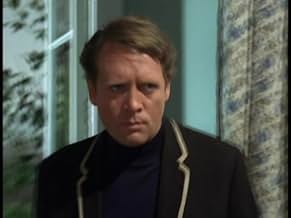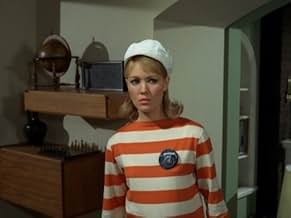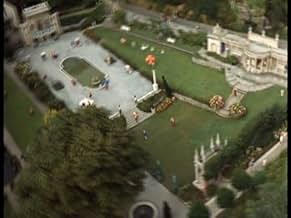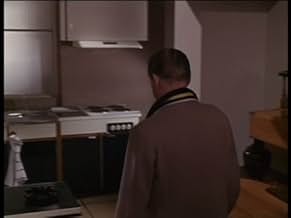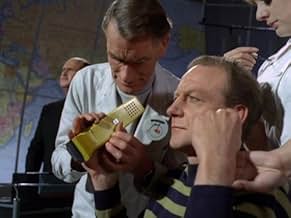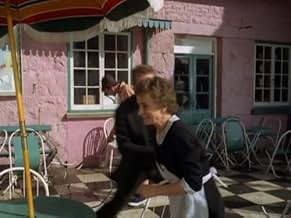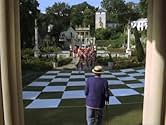Après sa démission, un agent secret est enlevé pour être emmené dans ce qui semble être un village idyllique, mais s'avère être une prison étrange. Son gardien veut des informations. Il ne d... Tout lireAprès sa démission, un agent secret est enlevé pour être emmené dans ce qui semble être un village idyllique, mais s'avère être une prison étrange. Son gardien veut des informations. Il ne dira rien mais va tenter de s'échapper.Après sa démission, un agent secret est enlevé pour être emmené dans ce qui semble être un village idyllique, mais s'avère être une prison étrange. Son gardien veut des informations. Il ne dira rien mais va tenter de s'échapper.
- Récompenses
- 1 victoire et 1 nomination au total
Parcourir les épisodes
Avis à la une
When it premiered in the US as a CBS summer series, no less than Isaac Asimov wrote an article in TV Guide praising it. So I was primed. "Arrival" was every bit at interesting as I expected, from the jazzy music and rapid-edited credit sequence all the way to that strange bicycle that assembled itself in the closing credits. The Village was beautiful and charming and hellish, with doors that open for you and mandatory classical music on the radio. McGoohan was perfect--he kept his cool but never wavered from his determination to find out who ran the show.
However, the idiots who ran my local CBS affiliate must have gotten calls from perplexed viewers. Next week, I was all set for episode two... and instead saw some crappy conventional syndicated spy show. Grrr. Since this was before cable, I never saw the rest of the series till PBS ran it.
It's hard to believe that any television network would agree to air something this wild. To this day, I can hear "I am not a number! I am a free man!" followed by maniacal laughter....
I loved the humor, too. One time Number Six had a double. His name--Number Twelve, of course. The whole concept of being labelled "unmutual" was worthy of Douglas Adams's "Share and Enjoy".
However, the idiots who ran my local CBS affiliate must have gotten calls from perplexed viewers. Next week, I was all set for episode two... and instead saw some crappy conventional syndicated spy show. Grrr. Since this was before cable, I never saw the rest of the series till PBS ran it.
It's hard to believe that any television network would agree to air something this wild. To this day, I can hear "I am not a number! I am a free man!" followed by maniacal laughter....
I loved the humor, too. One time Number Six had a double. His name--Number Twelve, of course. The whole concept of being labelled "unmutual" was worthy of Douglas Adams's "Share and Enjoy".
Just watched Once Upon A Time which for me is the best and most important episode in the series, the interplay between Patrick McGoohan and Leo McKern is quite simply brilliant. As for the series like many others I remember first seeing the show as a 10 year old, it left an indelible impression on me then and with time that impression hasn't faded one bit, I still consider it one of the finest television series ever created. I hope Hollywood nor anyone else attempt to remake it, it would be like a sad photocopy of the Mona Lisa, leave it alone please. To Patrick McGoohan and all those involved in creating it I'd just like to say 'THANK YOU'
For those who ask what the series is all about, I'd say watch it, and make your own mind up don't just accept my opinion on it, 'think' for yourself. Be seeing you.
For those who ask what the series is all about, I'd say watch it, and make your own mind up don't just accept my opinion on it, 'think' for yourself. Be seeing you.
Since its initial telecast, back in 1967, this enigmatic classic has evoked every reaction from awe to contempt. Given the amount of serious critical attention THE PRISONER has received, and given that a whole society has been created in its honor, I'd say the awe has won out, and I vehemently agree that THE PRISONER deserves to be honored as one of the truly artistic programs created for commercial television.
However, I can also understand the frustration many viewers have felt. Over the course of its seventeen episodes, this offbeat spy thriller becomes further and further offbeat until it ultimately transforms into surrealistic allegory. I confess I'm not sure whether this transformation was intended as a complete surprise, or whether you were supposed to know where the show was going, but in either case, I think you can better appreciate the series if you can see the earlier episodes as preparation for what's to come.
THE PRISONER's title character is a British secret agent (series creator Patrick McGoohan) who may or may not be SECRET AGENT's John Drake. The story begins with him suddenly and mysteriously resigning, then just as suddenly and mysteriously being rendered unconscious and transported to a place known only as The Village, the location of which is known only to those who run it. The Village is a prison camp, but with all of the amenities of a vacation resort,. Attractive dwellings, shops, restaurants, etc. exist side by side with high-tech methods of keeping order and extracting information from those who won't give it up willingly.
Those who try to escape get to meet Rover, a belligerent weather balloon capable of locomotion, and seemingly of independent thought. It appears (to me anyway) that the authorities can summon Rover, send it away, and give it instructions, but that it acts more or less on its own initiative. Rover deals with fugitives by plastering itself against their faces, rendering them either unconscious or dead, depending on how bad a mood it's in. Twice, we see it haul someone in from the ocean by sucking them up into a whirlpool it creates.
Citizens of The Village, including those in authority, are identified only by numbers. Our protagonist is known only as No. 6 throughout the entire series. The Village is run by No. 2, who in turn reports to an unseen and unidentified No. 1. No. 1 is apparently an unforgiving boss, because No. 2 is always being replaced.
Shortly after he arrives in in the Village, No. 6 is informed, by the reigning No. 2, that he should count on remaining there permanently. If he cooperates, life will be pleasant and he may even be given a position of authority. If he resists -- well, the only restriction they're under is not to damage him permanently. To satisfy his captors, No. 6 need only answer one question: `Why did you resign?' His question in turn is, `Who runs this place? Who is No. 1?'
Most of the episodes deal with No. 6's attempts to escape, and/or his captors' attempts to break him, although there are a few side trips. Several episodes suggest that No. 6's own people may be involved with running The Village. Some of the episodes are fairly straightforward, while others leave you with questions as to exactly what went on. It's important to note that several of the more obscure episodes -- for example, `Free for All' and `Dance of the Dead' -- are among the seven episodes that McGoohan considers essential to the series.
And then we come to the final episode, `Fall Out,' which promises to answer all the burning questions the viewers have been anguishing over for seventeen weeks -- and which so frustrated and angered those viewers back in 1967 that McGoohan had to go into hiding for awhile. Of course, I can't reveal any of the really important details, because, as No. 2 says in the recap that begins most of the episodes, `That would be telling,' and as all of us IMBD contributors know, `telling,' is frowned upon. However, to come back to the point with which I started, you should be prepared for a resolution of an entirely different nature than the one you'll probably be expecting -- a resolution that forces you to rethink your entire concept of the Village, and of the intention of the series. If you aren't ready, you'll be frustrated. If you are, you can accept THE PRISONER is the spirit in which it was offered.
However, I can also understand the frustration many viewers have felt. Over the course of its seventeen episodes, this offbeat spy thriller becomes further and further offbeat until it ultimately transforms into surrealistic allegory. I confess I'm not sure whether this transformation was intended as a complete surprise, or whether you were supposed to know where the show was going, but in either case, I think you can better appreciate the series if you can see the earlier episodes as preparation for what's to come.
THE PRISONER's title character is a British secret agent (series creator Patrick McGoohan) who may or may not be SECRET AGENT's John Drake. The story begins with him suddenly and mysteriously resigning, then just as suddenly and mysteriously being rendered unconscious and transported to a place known only as The Village, the location of which is known only to those who run it. The Village is a prison camp, but with all of the amenities of a vacation resort,. Attractive dwellings, shops, restaurants, etc. exist side by side with high-tech methods of keeping order and extracting information from those who won't give it up willingly.
Those who try to escape get to meet Rover, a belligerent weather balloon capable of locomotion, and seemingly of independent thought. It appears (to me anyway) that the authorities can summon Rover, send it away, and give it instructions, but that it acts more or less on its own initiative. Rover deals with fugitives by plastering itself against their faces, rendering them either unconscious or dead, depending on how bad a mood it's in. Twice, we see it haul someone in from the ocean by sucking them up into a whirlpool it creates.
Citizens of The Village, including those in authority, are identified only by numbers. Our protagonist is known only as No. 6 throughout the entire series. The Village is run by No. 2, who in turn reports to an unseen and unidentified No. 1. No. 1 is apparently an unforgiving boss, because No. 2 is always being replaced.
Shortly after he arrives in in the Village, No. 6 is informed, by the reigning No. 2, that he should count on remaining there permanently. If he cooperates, life will be pleasant and he may even be given a position of authority. If he resists -- well, the only restriction they're under is not to damage him permanently. To satisfy his captors, No. 6 need only answer one question: `Why did you resign?' His question in turn is, `Who runs this place? Who is No. 1?'
Most of the episodes deal with No. 6's attempts to escape, and/or his captors' attempts to break him, although there are a few side trips. Several episodes suggest that No. 6's own people may be involved with running The Village. Some of the episodes are fairly straightforward, while others leave you with questions as to exactly what went on. It's important to note that several of the more obscure episodes -- for example, `Free for All' and `Dance of the Dead' -- are among the seven episodes that McGoohan considers essential to the series.
And then we come to the final episode, `Fall Out,' which promises to answer all the burning questions the viewers have been anguishing over for seventeen weeks -- and which so frustrated and angered those viewers back in 1967 that McGoohan had to go into hiding for awhile. Of course, I can't reveal any of the really important details, because, as No. 2 says in the recap that begins most of the episodes, `That would be telling,' and as all of us IMBD contributors know, `telling,' is frowned upon. However, to come back to the point with which I started, you should be prepared for a resolution of an entirely different nature than the one you'll probably be expecting -- a resolution that forces you to rethink your entire concept of the Village, and of the intention of the series. If you aren't ready, you'll be frustrated. If you are, you can accept THE PRISONER is the spirit in which it was offered.
'The Prisoner' is one of those things that inspires either absolute devotion or utter confusion. There are no halfway reactions to this TV series. Many consider it to be the most imaginative and original TV show ever, and I'm inclined to agree with them. Nothing until 'Twin Peaks' came close to competing with it. However unlike 'Twin Peaks', 'The Prisoner' knew when to stop. There is hardly a bad episode in the whole series, and the final show is perfect. Patrick McGoohan will always have an important place in not only television history, but pop culture as a whole, from his involvement with this stunning and unforgettable show. To me it gets better and better as the years go by. If you haven't ever seen it make sure you do so! You don't know what you're missing!
This has become by far my favorite series of all time, so much so I have given up watching television altogether and turned to DVD's instead. That's not to say it's the best show ever, but it's one of those things you can watch as fluff action-adventure entertainment one day, or chew down to its bones, if you like, the next. That is, it doesn't require intelligence and concentration or an easy day at the office to enjoy, but if you've read a few books or have philosophical leanings you can amuse yourself by wringing quite a bit out of it.
On that note, it's especially fun to watch this series in conjunction with Danger Man/ Secret Agent. Although it isn't uncommon to have the same actors work together on different series, there is a town full of spies in DM/SA
referred to as the Village in the episode "Colony Three" which is the center of a debate on whether Number 6 and John Drake are the same. (McGoohan categorically denies this, but Markstein says it's true. Perhaps there is a legal hurdle involved? We will probably never get that information.)
I recommend watching them in order, so you can see Number 6 gradually abandon his open desperation and anger ("Arrival" to "The Chimes of Big Ben") for a cool and calculated needling of the system from within ("A, B and C" to "Hammer Into Anvil"). They try drugs, brainwashing, torture, virtual reality, letting him escape, and even babysitting to get him to talk. Each episode will appeal to someone different, some funny, some aggravating, but they all fit together by "Fall Out"; I have never met anyone who was not surprised at the final episode. It's truly extraordinary!
You will find references to the Prisoner are made constantly in other shows and movies, especially Sci Fi. The character Bester uses the Village greeting on Babylon 5; I have seen Village interrogation methods on the Pretender, John Doe and Farscape (whose leading man has an acting style similar to McGoohan's and a character similar to Number 6, IMHO, especially if you watch "A, B and C"); Number 2's trademark sphere chair is used on everything from Austin Powers to ads for American Idol.
The Village itself has appeared in tribute episodes of the Invisible Man and, of all things, the Simpsons ("The Computer Wore Menace Shoes"). Rover has actually appeared on the Simpsons twice!
I believe it's a classic that shouldn't be missed for anyone who ever feels trapped by rules that make little sense. If you like quoting Brazil and Office Space you'll find plenty of quotes to add to your collection here. My friends and I have even started referring to each other by number at work!
Be Seeing You!
On that note, it's especially fun to watch this series in conjunction with Danger Man/ Secret Agent. Although it isn't uncommon to have the same actors work together on different series, there is a town full of spies in DM/SA
referred to as the Village in the episode "Colony Three" which is the center of a debate on whether Number 6 and John Drake are the same. (McGoohan categorically denies this, but Markstein says it's true. Perhaps there is a legal hurdle involved? We will probably never get that information.)
I recommend watching them in order, so you can see Number 6 gradually abandon his open desperation and anger ("Arrival" to "The Chimes of Big Ben") for a cool and calculated needling of the system from within ("A, B and C" to "Hammer Into Anvil"). They try drugs, brainwashing, torture, virtual reality, letting him escape, and even babysitting to get him to talk. Each episode will appeal to someone different, some funny, some aggravating, but they all fit together by "Fall Out"; I have never met anyone who was not surprised at the final episode. It's truly extraordinary!
You will find references to the Prisoner are made constantly in other shows and movies, especially Sci Fi. The character Bester uses the Village greeting on Babylon 5; I have seen Village interrogation methods on the Pretender, John Doe and Farscape (whose leading man has an acting style similar to McGoohan's and a character similar to Number 6, IMHO, especially if you watch "A, B and C"); Number 2's trademark sphere chair is used on everything from Austin Powers to ads for American Idol.
The Village itself has appeared in tribute episodes of the Invisible Man and, of all things, the Simpsons ("The Computer Wore Menace Shoes"). Rover has actually appeared on the Simpsons twice!
I believe it's a classic that shouldn't be missed for anyone who ever feels trapped by rules that make little sense. If you like quoting Brazil and Office Space you'll find plenty of quotes to add to your collection here. My friends and I have even started referring to each other by number at work!
Be Seeing You!
Le saviez-vous
- AnecdotesThe Prisoner was filmed in the North Wales resort village of Portmeirion over the course of a year. Patrick McGoohan was inspired to film his series there after filming a couple of Destination danger (1960) episodes in the village.
- GaffesIn the opening sequence, the letter X is typed across the prisoner's photograph, but the typewriter typebar for the letter H is moving. The typebar for the letter X is at the far right of the frame.
- Crédits fousPortmeirion, Wales is not identified as the location for filming in all but the final episode. Instead the closing credits in these episodes simply say "Filmed on location."
- Versions alternativesIn the recent re-run of the series on the Horror channel in the U.K. whenever anyone is attacked by Rover, the screen simply changes to a swirling vortex. When shown originally, the victim's face was pressed into Rover's 'skin'
- ConnexionsEdited into Derrick contre Superman (1992)
Meilleurs choix
Connectez-vous pour évaluer et suivre la liste de favoris afin de recevoir des recommandations personnalisées
Détails
- Date de sortie
- Pays d’origine
- Langue
- Aussi connu sous le nom de
- The Prisoner
- Lieux de tournage
- Abingdon Street, Londres, Angleterre, Royaume-Uni(underground carpark in title sequence)
- Sociétés de production
- Voir plus de crédits d'entreprise sur IMDbPro
Contribuer à cette page
Suggérer une modification ou ajouter du contenu manquant

Lacune principale
What was the official certification given to Le prisonnier (1967) in Canada?
Répondre



